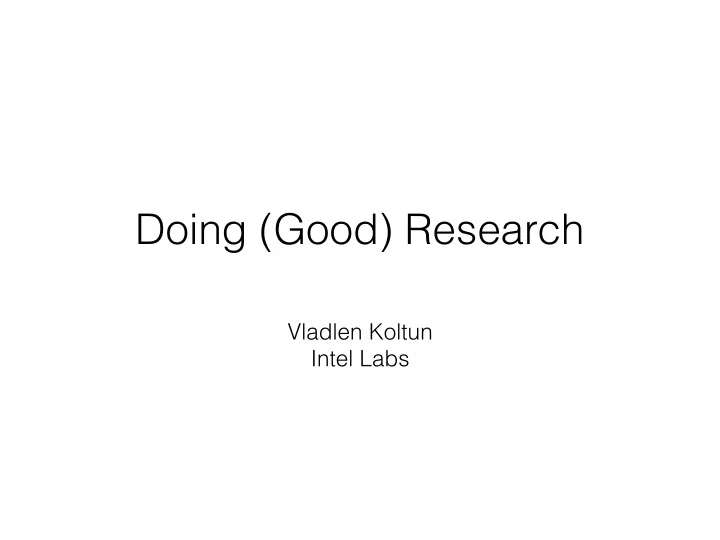

Doing (Good) Research Vladlen Koltun Intel Labs
Research • A collective adventure • An engineering discipline. We build things that are useful. • Your goal: Contribute to this collective enterprise
Ways to contribute • Solve a problem people care about • Camera calibration? Normalized eight-point algorithm. (Hartley) • Robust correspondences? SIFT. (Lowe) • Introduce useful tools • Graph cuts for Markov random fields. (Zabih et al.) • Variational methods. (Horn–Schunck)
Ways to contribute • Build an inspiring system, demonstrate a compelling application • Dickmanns: Autonomous driving • Snavely, Seitz, Szeliski: Photo tourism • Shotton et al.: Kinect pose recognition • Propose a new problem • Category-level recognition. (Perona et al.) • Non-photorealistic rendering. (Salesin) • Semantic segmentation. (Zemel et al.)
Ways to contribute • Service and infrastructure • Performance evaluation of local descriptors (Mikolajczyk-Schmid) • Berkeley segmentation dataset (Malik et al.) • Middlebury datasets and benchmarks (Scharstein, Szeliski, et al.) • OpenCV (Bradski), Caffe (Darrell et al.) • Exposition • Bundle adjustment – A modern synthesis (Triggs et al.) • Jordan’s tutorials (Variational methods, MCMC, graphical models)
Picking an area • Green pastures • Neither too late nor too early • Do the most useful thing you are qualified to do
Picking a problem • Formulate a larger goal • Personally meaningful • Fits into the scheme of collective progress • Analyze bottlenecks • Understand the state of the art
Making a contribution • Read the papers • Look for unwarranted assumptions • What are the limitations? When will this break? How could this be done better? • Reimplement a state-of-the-art technique • Reproduce the results • Then bombard it with controlled experiments • Look for surprises, cracks that lead to deeper realizations
Diversions • Be on the lookout for interesting contributions • Many important results are not what the researchers set out to find • “Scheele happened upon chlorine while trying to isolate manganese; Claude Bernard planned experiments to characterize the destructive agent in sugar but instead discovered the glycogenic function of the liver; and so on.” (Ramón y Cajal, Letters to a Young Investigator)
Publication • Quality over quantity • Do not compromise on methodology or ethics • Be willing to bury drafts and move on
Publication portfolio • A portfolio of methodologically rigorous results • Most are prosaic • Some are significant • None are sloppy
High standards • Bury the weak, boring, and sloppy results • Weak and sloppy work is a drain on the community. Can mislead. Goes against the goal of contributing something useful to the community. • Quantity is easy. The community doesn’t need more quantity.
Research over time • Research begets research • Keep track of favorite problems, revisit occasionally • Go back to the larger goals • Read. A lot. • Write down ideas. Talk to people. • Quiet time for reading, writing, thinking
Work ethic I do not believe a person can ever leave their business. They ought to think of it by day and dream of it by night. […] if they intend to go forward and do anything, the whistle is only a signal to start thinking over the day’s work in order to discover how it might be done better. […] The person who has the largest capacity for work and thought is the person who is bound to succeed. Henry Ford, My Life and Work Edited for gender neutrality
Work ethic In science as in the lottery, luck favors those who wager the most – that is, by another analogy, those who are tilling constantly the ground in their garden. Ramón y Cajal, Letters to a Young Investigator Edited for gender neutrality
Work ethic Successful people exhibit more activity, more energy, than most people do. They look more places, they work harder, they think longer than less successful people. Knowledge and ability are much like compound interest – the more you do the more you can do, and the more opportunities are open for you. Hamming, Striving for Greatness in All You Do
Ethics • Don’t cheat • Give proper credit • Support younger researchers
Thank you
Recommend
More recommend